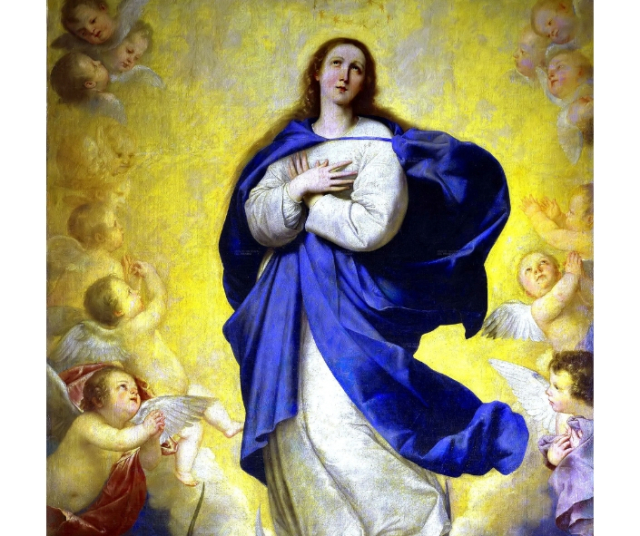The Immaculate Conception is a religious festival that is celebrated every December 8 in Spain . This date commemorates the Catholic belief that the Virgin Mary was conceived without original sin from the moment of her conception. This holiday is of great importance in the Spanish Catholic tradition and is a day of devotion and celebration for millions of believers throughout the country.
Origins and Meaning of the Immaculate Conception
The historical context of the belief in the Immaculate Conception is framed in the Middle Ages and the Modern Age, times in which it developed and was the subject of controversy and theological debate in the Catholic Church.
From the first centuries of Christianity, the figure of the Virgin Mary was the object of special devotion and admiration for her role as mother of Jesus. However, the belief in the Immaculate Conception, that is, that Mary was conceived without original sin from the moment of her conception, did not become established as an official doctrine until centuries later.
During the Middle Ages , some theologians and thinkers began to reflect on the purity and holiness of Mary, arguing that, as the mother of Jesus, she should have been conceived in a special way and untainted by original sin. These approaches generated a theological debate on the nature of Mary and her relationship with original sin. As Marian devotion intensified, so did interest in affirming the purity and holiness of Mary from her conception. In the Modern Age, the debate on the Immaculate Conception became more acute, with different theologians and theological currents taking positions for or against this belief.
In the 17th century, the controversy came to a head, and the Catholic faithful began to ask for an official definition from the Church. It was in the 19th century, in 1854, during the pontificate of Pope Pius IX, when the Immaculate Conception was officially proclaimed as a dogma of faith in the bull " Ineffabilis Deus ".
The proclamation of the dogma of the Immaculate Conception was a significant step in Catholic Mariology and consolidated the belief in the purity and holiness of Mary from the first moment of her existence. Since then, the feast of the Immaculate Conception has become one of the most important in the liturgical calendar of the Catholic Church, being honored and celebrated by millions of believers around the world.
The Celebration of the Immaculate Conception in Spain
On December 8, Spain dresses up in celebration and devotion to celebrate the Immaculate Conception. It is a public holiday throughout the country, allowing families and communities to come together to participate in various religious and cultural activities.
Masses and religious ceremonies are the center of the celebration. The churches and cathedrals are filled with parishioners who come to pay homage to the Virgin Mary and participate in acts of worship and prayer. In some cities, solemn processions are carried out in which an image of the Immaculate Conception is carried through the streets, while believers accompany it with songs and prayers.
In many towns, open-air markets and fairs are also organized where merchants sell religious items such as images of the Virgin, rosaries and medals. In addition, you can find food stalls and sweets typical of the Christmas season. Another popular tradition on this holiday is the making and display of altars dedicated to the Immaculate Conception in homes and public spaces. These altars are decorated with flowers, candles, and religious items, and are a way of honoring and showing devotion to the Virgin Mary.
In some regions of Spain, especially Andalusia, dances and folk dances are performed in honor of the Immaculate Conception. These cultural manifestations show the richness and diversity of Spanish traditions and reflect the fusion between the religious and the popular in this festivity.
The Immaculate Conception in Spain and Christmas
The celebration of The Immaculate Conception marks the official start of the Christmas season in Spain . It is a time of spiritual preparation and joy in anticipation of the arrival of Christmas, which is celebrated with great enthusiasm throughout the country.
The festive and religious atmosphere extends throughout the month of December, with the decoration of streets, squares and homes with lights, Christmas decorations and nativity scenes (representations of the birth of Jesus). Families get together to share typical seasonal foods, such as nougat, polvorones and roscón de reyes. The Immaculate Conception also marks the beginning of the Christmas posadas, a tradition that symbolizes the pilgrimage of Mary and Joseph in search of a place to stay in Bethlehem. In the inns, neighbors and friends visit each other, sing Christmas carols and act out the scene of the birth of Jesus.
